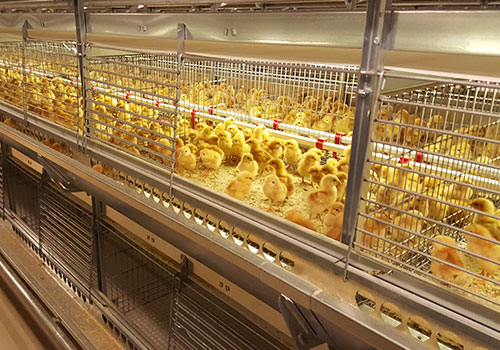1. Sensitive to temperature, both cold and hot
The nervous system of the chicks that have just emerged from the shell is not well developed, and thus the thermoregulatory ability is poor. The newborn chicks are small in size, thin in feathers, and have a body temperature 3 ° C lower than normal chickens, and tend to be normal at 7 to 10 days of age. At low temperatures, the chicks feel cold; on the contrary, when the ambient temperature is too high, the chickens do not sweat and can not dissipate body heat by perspiration, and the chicks will feel uncomfortable. In short, the chicks are very sensitive to temperature reactions, and the brooding temperature should be strictly controlled during brooding.
2. The digestive system is not perfect and grows fast.
The chick's sac and gastrointestinal volume are small, and the digestion ability of the feed is poor. The chicks have the characteristics of rapid growth and development. The weight of the laying hens at the age of 6 weeks has reached about 10 times the weight of the shell, and the average weekly weight gain is 1.6 times. The weight of the broilers at 6 weeks is more than 65 times that of the shell. Therefore, when preparing chick diets, we strive to be nutritionally sound and easy to digest.
Since the digestive system of the chick is still not mature, it must be noted that the ingredients in the supplied roughage can be used for chicks to feed and are easy to digest, while the total fat content in the feed should be kept low, and the feeding of saturated animal fat should be avoided. feed. If the crude protein content in the initial diet ratio is less than 22% or the lysine content is less than 1.16%, it is easy to cause the broiler to reach the ideal target at 7 days of age.

3. Sensitive to external reactions
The chicks are extremely sensitive to changes in the external environment. The various sounds in the brooding house, all kinds of novel colors or the entry of strangers will cause the chickens to be disturbed and affect the growth. In severe cases, they will be crushed and killed by sudden shock. Therefore, the brooding house should be kept quiet, and the brooding personnel should be relatively stable and should not be replaced frequently.
4. Small and delicate, poor disease resistance
The chicks are small and delicate, and their resistance is poor. It is easy to infect diseases due to the invasion of various microorganisms. Therefore, brooding should be carefully managed and raised to improve the physical fitness of the chicks, and the environmental sanitation in the brooding house should be carefully carried out, and the veterinary epidemic prevention system should be strictly implemented.
Nowadays, with the gradual expansion of farming, although automatic poultry farming equipment makes it easier to raise chickens, it still requires daily observation and management by farmers. A two-pronged approach can maximize benefits.









